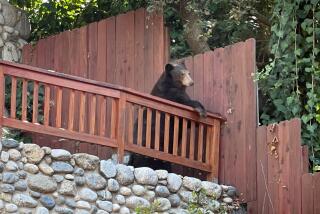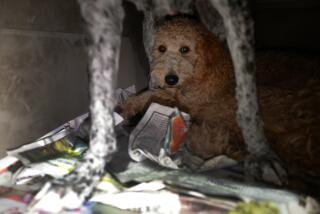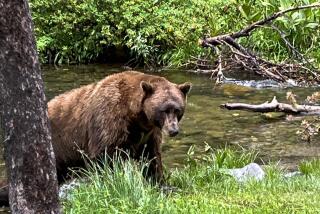California bill would outlaw hunting of bears, bobcats with dogs
YOLO COUNTY — Josh Brones trailed his three hounds as they scampered through the heavy brush of a gully, sniffing for the scent of a bobcat. The dogs have treed many a wild animal in these remote hunting grounds north of Sacramento.
Like generations of houndsmen before him, Brones raised Sequoia, Tanner and Dollar from pups and trained them to track a scent for miles. He ran with them dozens of times as they set off, barking, on the heels of a black bear, bobcat or wild hog.
But now that way of life is threatened in California, Brones lamented as he shifted his backpack and called the dogs back to his side.
Animal rights groups say using dogs fitted with electronic tracking devices to hunt bears and bobcats is cruel and unfair and should be outlawed in California. Hunting bears with hounds is banned in 14 states, including Arkansas, Colorado, Montana, Oklahoma, Oregon and Wyoming.
“It’s typically a high-tech hunt that results in an animal being shot out of a tree, which is unsporting and the equivalent of shooting an animal in a cage at the zoo,” said Wayne Pacelle, president of the Humane Society of the United States.
A bill that would ban the hound hunting has been approved by the state Senate and is headed with momentum toward the Assembly floor. Along the way it has illuminated a deep cultural divide in California.
The proposal has riled up hunters who see it as an attack on their lifestyle — a clash between the values of rural and urban California.
“It’s intolerance run amok,” said Brones, president of California Houndsmen for Conservation. “It’s a reflection of the changing demographics of California as it becomes increasingly urbanized and people have less appreciation for traditional lifestyles such as hunting and fishing, and where our food comes from.”
The dispute grew out of another controversy, when Daniel W. Richards, the president of the state Fish and Game Commission, killed a mountain lion in January during a dog-assisted hunt in Idaho. Sporting hunting of cougars has been banned for decades in California but is legal in Idaho.
Backed by hunting groups, Richards rejected calls for his resignation from more than 40 state legislators, including state Sen. Ted Lieu (D-Torrance), who said Richards’ killing of the cougar showed poor judgment. Unable to force Richards from office, Lieu introduced SB 1221, the ban on hunting bears and bobcats with dogs.
It’s a tradition that goes back centuries. Famous hound-hunters have included George Washington, Daniel Boone and Teddy Roosevelt.
But the appeal to tradition cuts both ways; the state flag prominently features a grizzly bear in homage to an animal hunted out of existence in the wilds of California in 1922.
Today, 5,200 hunters use hounds in California. State officials estimate they took less than half of the nearly 1,600 black bears killed in the state last year and fewer than 20% of the 1,195 bobcats.
State biologists say the population of black bears has increased in recent decades, to about 32,000 now, and the population of bobcats likewise appears to be flourishing.
That, according to dog owner Dan Tichenor, is proof that using hounds is not negatively affecting wildlife management in the state. He and other houndsmen are frequently called when state Fish and Game officials need to catch a rogue bear or university researchers need to track and tag mountain lions, he said.
“Hounds have been used here for over 50 years for research because it is the safest and most humane way of catching the animal,” said Tichenor, who along with Brones helps UC Santa Cruz biologists in their mountain lion research.
Brones, who fell in love with the sport after he read “Where the Red Fern Grows” in fifth grade, does most of his hound-aided hunting with a camera rather than a gun. Using dogs allows for catch-and-release, where the hunter lets the animal go once it is cornered and photographed.
He and his hounds have chased about 150 bears up trees in the last 26 years, but only four of them were killed. He has treed about 65 bobcats in that time, and he and a hunting companion killed three — one to eat and two for a children’s museum.
Brones, who is an executive with an education software company, said hunting with dogs gives bears and bobcats more of a sporting chance because the barking of approaching dogs gives them advance warning and a chance to escape. Bears can run for miles and reach speeds up to 30 mph.
Tichenor said last season his dogs ended up chasing bears up trees about half the time they picked up a scent.
Brones compares that kind of chase to the situation in which a hunter sneaks up on the unsuspecting animal and takes a shot from distance using a scope — which he argues is less sporting.
The notion that shooting a bear in a tree is inhumane is disputed by Bill Gaines, president of the California Outdoor Heritage Alliance, a coalition of hunting and conservation groups.
Shooting a bear in a tree allows the hunter a clear shot that means the bear will die immediately, while shots from greater distance might wound the animal resulting in it running off to suffer, he said.
“We do not want the challenge to be in the shot,” Brones added. “We want the challenge to be putting yourself in a position for the shot. “We don’t want the animal to suffer.”
About 240 opponents of the bill attended a hearing at the Capitol last month, many wearing orange lapel buttons that read “Revenge is not the answer,” a reference to their belief that the bill is retaliation for Richards’ actions. The geographical divide was evident at the hearing.
Dozens of animal rights activists, many from the San Francisco and Los Angeles areas, urged lawmakers to pass the bill. They were outnumbered by defenders of hound hunting, most from more-rural counties including Trinity, Humboldt, Sutter and Butte. Fifteen boards of supervisors from rural counties oppose the measure.
Hound hunters threaten to refuse to buy licenses, depriving the state of significant revenue, and instead do their hunting in other states.
Lieu acknowledged the Richards controversy brought hound-hunting to his attention but said his bill should be approved on its own merits.
“There is nothing sporting in slaughtering an exhausted bear clinging to a tree limb or having hounds tear apart a bobcat,” Lieu said.
He said it could also result in dogs being hurt or lost.
Assemblyman Bill Berryhill (R-Ceres) said that some of the states that ban hunting bears with dogs are home to grizzly bears that, unlike black bears, can be expected to stand and fight the dogs rather than run up trees. Montana allows hound hunting for bobcats and mountain lions, Brones said.
More to Read
Sign up for Essential California
The most important California stories and recommendations in your inbox every morning.
You may occasionally receive promotional content from the Los Angeles Times.











